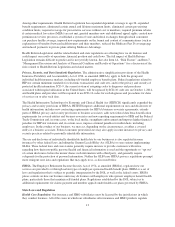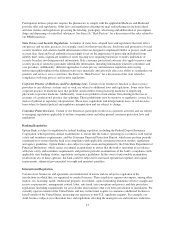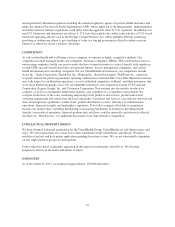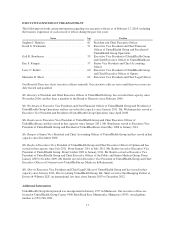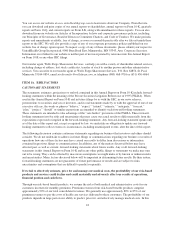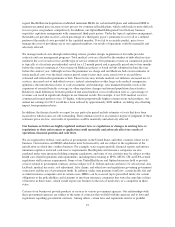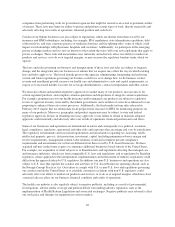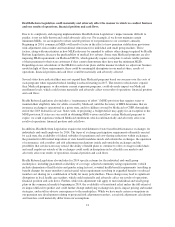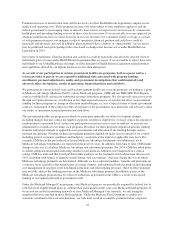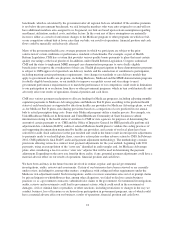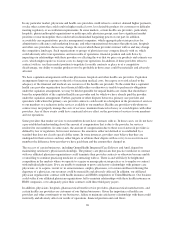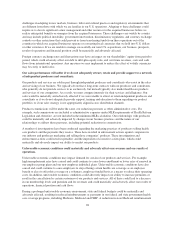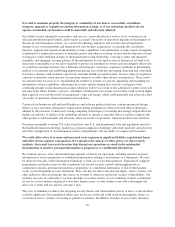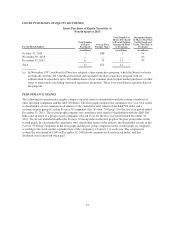United Healthcare 2013 Annual Report Download - page 25
Download and view the complete annual report
Please find page 25 of the 2013 United Healthcare annual report below. You can navigate through the pages in the report by either clicking on the pages listed below, or by using the keyword search tool below to find specific information within the annual report.benchmark, which is calculated by the government after all regional bids are submitted. If the enrollee premium
is not below the government benchmark, we risk losing the members who were auto-assigned to us and will not
have additional members auto-assigned to us. In general, our bids are based upon certain assumptions regarding
enrollment, utilization, medical costs, and other factors. In the event any of these assumptions are materially
incorrect, either as a result of unforeseen changes to the Medicare program or other programs on which we bid,
or our competitors submit bids at lower rates than our bids, our results of operations, financial position and cash
flows could be materially and adversely affected.
Many of the government health care coverage programs in which we participate are subject to the prior
satisfaction of certain conditions or performance standards or benchmarks. For example, as part of Health
Reform Legislation, CMS has a system that provides various quality bonus payments to plans that meet certain
quality star ratings at the local plan level. In addition, under Health Reform Legislation, Congress authorized
CMS and the states to implement MME managed care demonstration programs to serve dually eligible
beneficiaries to improve the coordination of their care. Health plan participation in these demonstration programs
is subject to CMS approval of specified care delivery models and the satisfaction of conditions to participation,
including meeting certain performance requirements. Any changes in standards or care delivery models that
apply to government health care programs, including Medicare, Medicaid and the MME demonstration programs
for dually eligible beneficiaries, or our inability to improve our quality scores and star ratings to meet
government performance requirements or to match the performance of our competitors could result in limitations
to our participation in or exclusion from these or other government programs, which in turn could materially and
adversely affect our results of operations, financial position and cash flows.
CMS uses various payment mechanisms to allocate funding for Medicare programs, including adjusting monthly
capitation payments to Medicare Advantage plans and Medicare Part D plans according to the predicted health
status of each beneficiary as supported by data from health care providers for Medicare Advantage plans, as well
as, for Medicare Part D plans, risk-sharing provisions based on a comparison of costs predicted in our annual
bids to actual prescription drug costs. Some state Medicaid programs utilize a similar process. For example, our
UnitedHealthcare Medicare & Retirement and UnitedHealthcare Community & State businesses submit
information relating to the health status of enrollees to CMS or state agencies for purposes of determining the
amount of certain payments to us. CMS and the Office of Inspector General for HHS periodically perform risk
adjustment data validation (RADV) audits of selected Medicare health plans to validate the coding practices of
and supporting documentation maintained by health care providers, and certain of our local plans have been
selected for audit. Such audits have in the past resulted and could in the future result in retrospective adjustments
to payments made to our health plans, fines, corrective action plans or other adverse action by CMS. In February
2012, CMS published a final RADV audit and payment adjustment methodology. The methodology contains
provisions allowing retroactive contract level payment adjustments for the year audited, beginning with 2011
payments, using an extrapolation of the “error rate” identified in audit samples and, for Medicare Advantage
plans, after considering a fee-for-service “error rate” adjuster that will be used in determining the payment
adjustment. Depending on the error rate found in those audits, if any, potential payment adjustments could have a
material adverse effect on our results of operations, financial position and cash flows.
We have been and may in the future become involved in routine, regular, and special governmental
investigations, audits, reviews and assessments. Certain of our businesses have been reviewed or are currently
under review, including for, among other matters, compliance with coding and other requirements under the
Medicare risk-adjustment model. Such investigations, audits or reviews sometimes arise out of or prompt claims
by private litigants or whistleblowers that, among other allegations, we failed to disclose certain business
practices or, as a government contractor, submitted false claims to the government. Governmental investigations,
audits, reviews and assessments could lead to government actions, which could result in the assessment of
damages, civil or criminal fines or penalties, or other sanctions, including restrictions or changes in the way we
conduct business, loss of licensure or exclusion from participation in government programs, any of which could
have a material adverse effect on our business, results of operations, financial position and cash flows.
23


